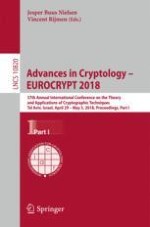2018 | OriginalPaper | Buchkapitel
Short, Invertible Elements in Partially Splitting Cyclotomic Rings and Applications to Lattice-Based Zero-Knowledge Proofs
verfasst von : Vadim Lyubashevsky, Gregor Seiler
Erschienen in: Advances in Cryptology – EUROCRYPT 2018
Aktivieren Sie unsere intelligente Suche, um passende Fachinhalte oder Patente zu finden.
Wählen Sie Textabschnitte aus um mit Künstlicher Intelligenz passenden Patente zu finden. powered by
Markieren Sie Textabschnitte, um KI-gestützt weitere passende Inhalte zu finden. powered by
